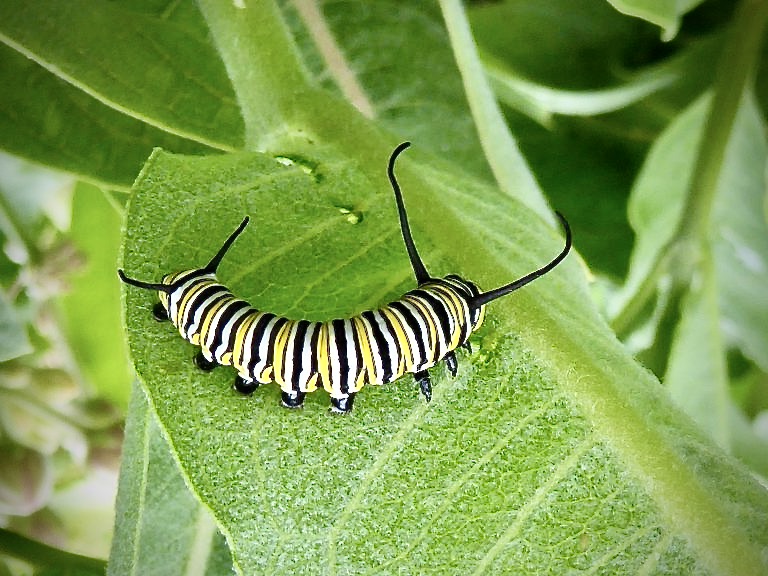Rector's Reflection: A Season of Restoration, September 6, 2025
- Sep 6, 2025
- 4 min read

Beloved Members of St. Martin's,
Once, when I was about 12, a cluster of the autumn great monarch butterfly migration actually stopped in the woods across from my granddad's house. I remember being awed by the hundreds of pairs of orange wings that rested on the line of fir trees that bordered the baseball fields, resting before heading out the next morning. I was surprised, but I wasn't necessarily shocked, because back then monarchs were thought to be as common as a flock of sparrows. Back then, monarchs were ho-hum. You could see dozens of them every day from March through October.
Twenty years later, how things had changed. By the time my own children were little, and of an age to notice, seeing a monarch at any time of year had become a rare sight. We got incredibly excited one year when we actually had one of the late-summer caterpillars destined to make the migration form a crysalis in the frame of our patio door. The day it emerged, strengthened its wings in the sun, and flew away was a day of wonder in our household. And the next year my kids and I planted milkweed, their favorite food, in hopes of a repeat performance. A photo of one of "our" caterpillars will grace the cover of the 10:30 bulletin, and a photo of the butterfly it became will be on the cover of the 505 bulletin for this weekend.
In the last twenty years especially, factors such as pesticide use and habitat loss have caused a crash in the monarch population, and that is worrisome because, alongside a simultaneous honeybee colony collapse, it indicates a decline in pollinators, which can dramatically affect the food supply. The good news is that, as people have become aware of the issue, they have started acting to restore crucial habitat, including restoring prairie ecosystems, reducing the use of pesticides, and even planting backyard patches of wildflowers can help. The food chain web reminds us that helping these tiny creatures also helps humans, as one out of every three bites of food we eat is dependent upon pollination by butterflies, bees, and birds.
Creation care matters. There are millions of practical reasons why we need to be mindful of our impact upon the Earth and the environment: no other species has as much potential to either protect or pollute our land and water. But there is also a spiritual aspect to this crisis, as care for creation is an act of reverence for God and for each other, a practical way to engage in the Great Commandment. That's why I was so excited to be able to assist with the work of the Creation Care Caucus of deputies and bishops at the last General Convention in July of 2024, as we sought to encourage engagement with environmental issues at the triannual gathering of deputies and bishops from all across the Episcopal Church.
The first step of solving any problem is awareness. That is why this Sunday you will notice that we are using new liturgical prayers, emphasizing a theme of creation, and we will be using them from now until October 5. What once was a single day among the Orthodox tradition eventually grew to a focus from September 1 through October 4, the feast day of St. Francis of Assisi.
This program of focus on creation originally was promoted by the World Council of Churches in 2008, which is when some Episcopal churches first started their observance of this time to pray about and work for the restoration of our loving care of our relationship with God and this planet and all its living things, all of whom are the handiwork of the Creator.
I invite you to learn more about Creation Care in the Episcopal Church here on the main website for our denomination.
There are many beautiful prayers from across the Anglican communion that we will be able to meditate upon and pray during this brief season. You can also see the collection of prayers and spiritual writings gathered for worship in Episcopal parishes here, and perhaps even use some of these resources in your own praying of the daily office.
You can learn about ways the Episcopal Church and her members are working to urge action on environmental concerns in Washington DC by learning about Creation Care activity from the Episcopal Public Policy Network.
You can even sign up to get a daily devotion delivered to your email inbox by following this link.
I hope that these next few weeks inspire you to get out into the beauty of creation and let God's handiwork feed your soul. As harvest time approaches, I hope that you can give thanks for the many hands that work to bring the food you enjoy from field, farm, forest and sea to your own tables.
As you approach the altar rail for communion, I hope you can be filled with wonder that communion itself depends upon wheat, rice, or potato flour and grapes and clean water, transformed through the work of human hands, to remind us of our call to remember Christ's saving work in the world as well as our God-given responsibility to tend the Earth lovingly.
In Christ,
Mother Leslie+